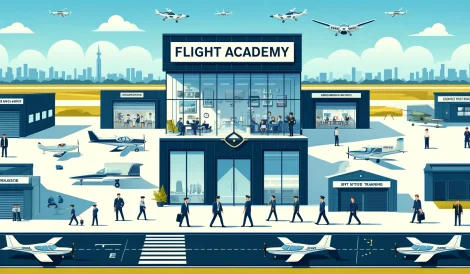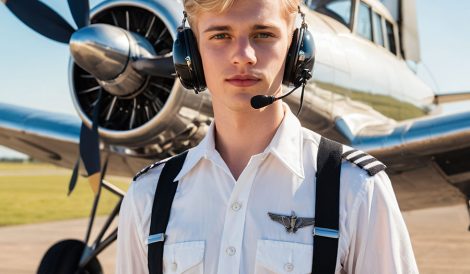Stepping into the world of aviation and becoming a pilot is an exciting but also a meticulous process. Here are the basic steps of this process:
1. Goal Setting
The decision to become a pilot involves choosing a specific aircraft type and career goal. At this stage, it is important to research different areas in the aviation world and clarify personal goals.
2. Training Program Selection
Choosing an appropriate training program is the first step in becoming a successful pilot. Enrolling in a program that complies with accreditations and local aviation authority requirements will provide a solid foundation.
3. Basic Education
Basic training aims to provide theoretical knowledge to pilot candidates. Subjects such as flight principles, air law and navigation are among those learned at this stage.
4. Flight Training
Flight training is the stage where theoretical knowledge is put into practice. Flight simulators and real flights help aspiring pilots improve their skills.
5. Medical Examination and Licensing
The medical examination performed by the aviation doctor evaluates the health status of pilot candidates. Then, the exams required for licensing are prepared and successfully passed.
6. Practical Applications and Experience
Gaining experience in different aircraft types and increasing flight hours helps pilot candidates improve themselves.
7. Professional Development and Job Applications
Advanced training is continued, airline companies’ requirements are followed and job applications are made. When success is achieved in the interview process, the person begins his career as a pilot.
Becoming a pilot is a long and disciplined process. But every step is a step towards making the dream of meeting the sky a reality. Remember, the blue sky is just your limit!
I hope this brief summary helps you clarify the process of becoming a pilot!
“Skills and Qualifications Required to Become a Pilot”
Being a pilot is a special profession and it is important to have certain skills and qualifications to be successful in this field. Here are the basic skills and qualities a pilot needs to be successful:
1. Excellent Visual and Spatial Abilities:Pilots must be able to observe their surroundings well and have spatial orientation abilities when flying in complex airspace.
2. Good Intelligence and Calculation Skills: Pilots must have quick thinking and decision-making abilities in matters such as air traffic management, meteorology and flight planning.
3. Good Communication Skills:Effective communication is critical for pilots. It is important to be able to communicate accurately and clearly with control towers, other crew members and passengers
4. Physical and Psychological Endurance:Being physically and psychologically resilient during long flights helps pilots make the right decisions in critical situations.
5. Predisposition to Teamwork: Being able to work within an aircraft crew and ensuring team harmony in crisis situations affects the success of pilots.
6. Mastery of Technology: Modern aircraft are based on high technology. Pilots must be able to use flight systems effectively and have technical knowledge against problems.
7. Good Time Management: Flights may be subject to frequently changing schedules. Pilots must be able to manage their time effectively and stick to their flight plans.
8. Awareness of Responsibility:Pilots are responsible for passenger safety and the security of the aircraft. Therefore, awareness of responsibility is important.
The process of becoming a pilot usually requires special training, and in this process, candidates must comply with criteria such as completing certain flight hours and passing exams. This article provides a general guide on which skills pilot candidates should focus on.
“Aviation of the Future and the Pilot Profession”
Today, the aviation industry is rapidly adapting to technological and environmental changes. Here are some important headlines about the aviation of the future and the pilot profession:
1. Autonomous Flight Technologies:With the advancement of artificial intelligence and autonomous systems, autonomous flights may be the norm of the future. This will affect the role and training needs of pilots.
2. Hybrid and Electric Airplanes: In line with sustainability goals, the aviation industry is turning to hybrid and electric aircraft. This can reduce fuel costs and reduce environmental impacts.
3. Artificial Intelligence and Data Analytics:By analyzing flight data, airlines can optimize maintenance processes and increase operational efficiency. Artificial intelligence can also be integrated into pilots’ decision processesir.
4. Sustainable Aviation: Efforts to reduce carbon footprint, the use of biofuels, and the transition to green technology will play a key role in moving aviation towards a sustainable future.
5. Pilot Training and Skills: As autonomous flights become more widespread, pilots’ ability to adapt to technology and troubleshooting skills will become even more important. In this context, training programs may need to be updated.
6. Remote Working and Virtual Reality:Flight simulations and virtual reality can enable pilots to train and improve their skills remotely.
As the aviation of the future is shaped by technological innovations, it is important for pilots to adapt to these changes and focus on developing skills. Keeping up with these dynamic changes in the industry can help aviation professionals strengthen their careers.




